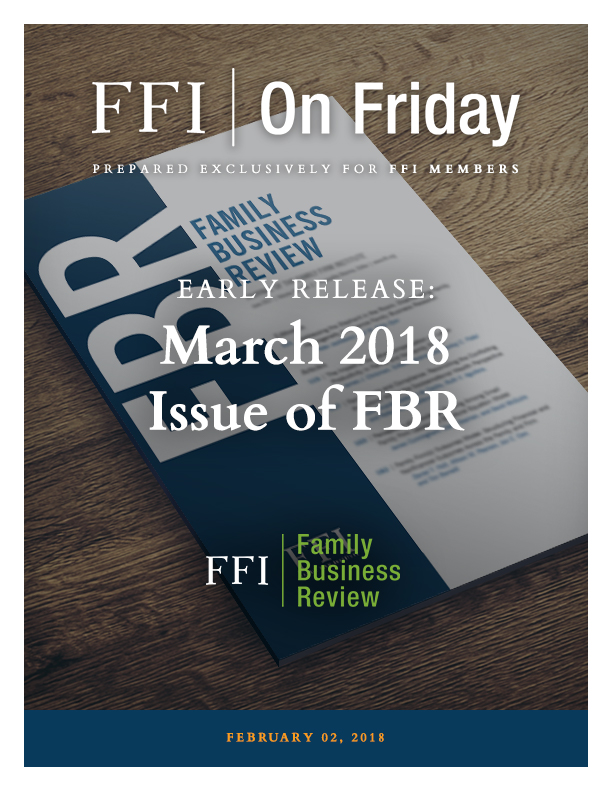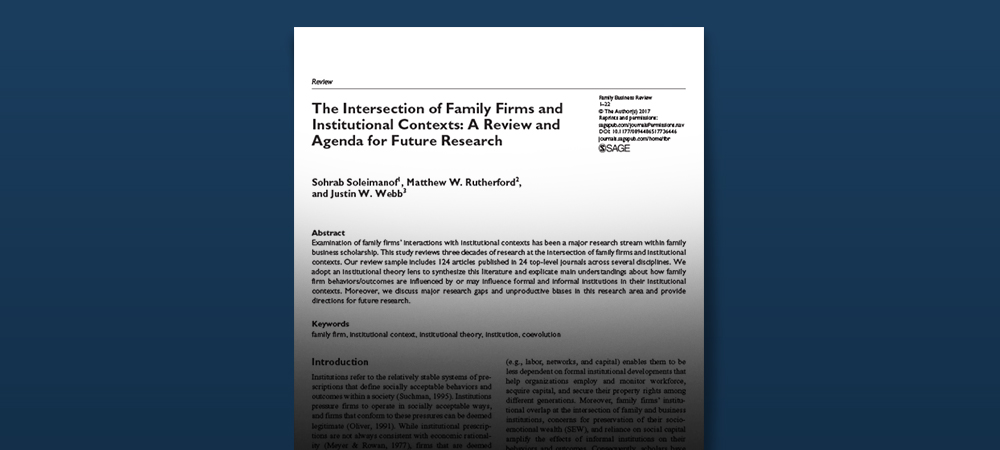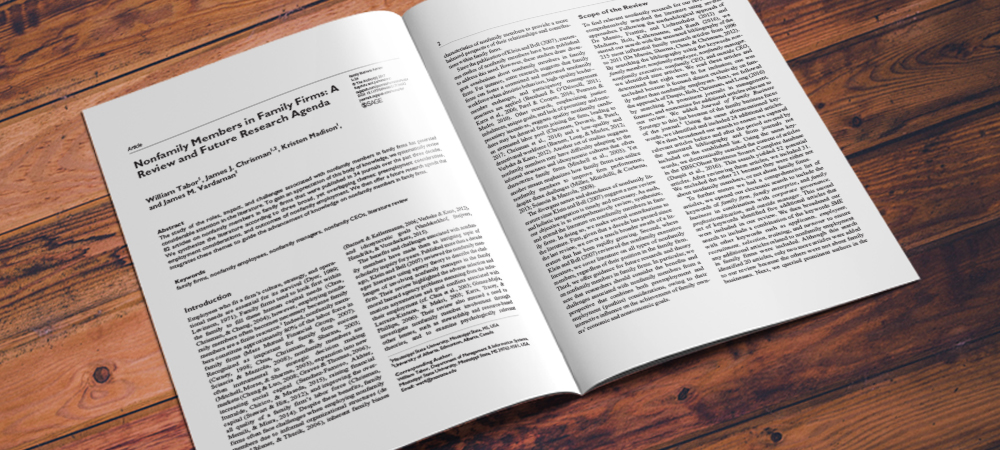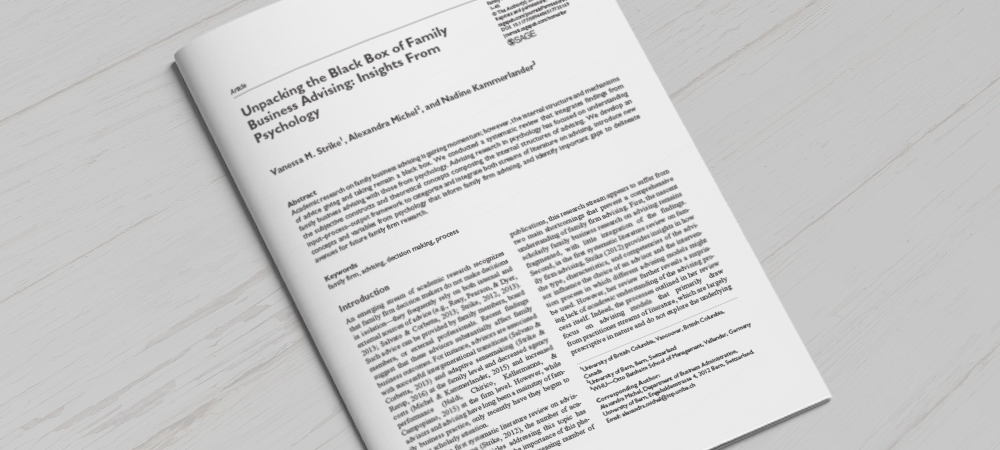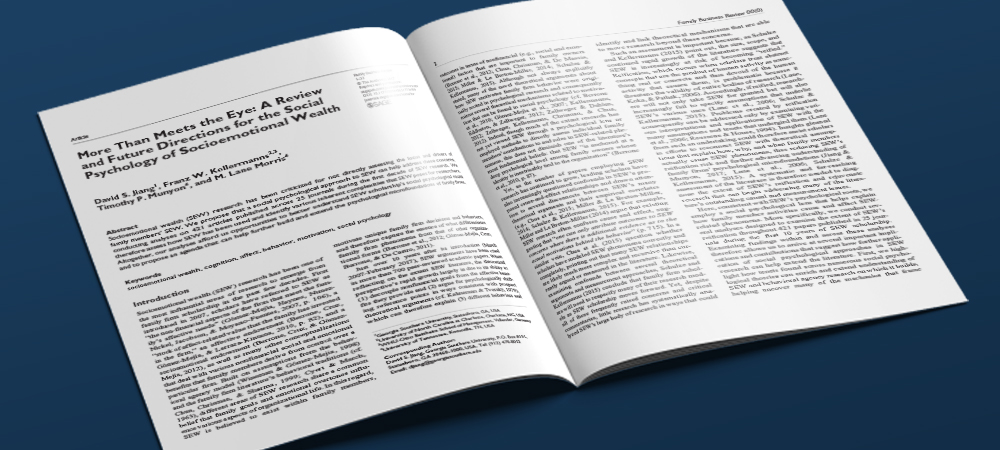FFI On Friday | February 02, 2018
Prepared Exclusively for FFI Members
Early Release:
March 2018 Issue of FBR

We are pleased to provide you with an advance look at the March 2018 issue of Family Business Review (FBR).
As a member of FFI, you have access to the complete library of FBR articles at no charge. Log in to FFI.org, click on “Educate” from the top menu, then Family Business Review, then select “Access FBR.”
Editorial
Looking Back and Moving On
G. Tyge Payne, Pramodita Sharma
The year 2017 continued to reinforce the anchoring position of FBR in family business studies. Key metrics and trends of FBR indicate a strong, stable journal that is widely read and supported by a dedicated and growing community of scholars. If the best predictor of future performance is past performance, then we are optimistic about the future of FBR. Indeed, in a typical family business tradition, we hope to leverage our past successes to help us continue to expand our status and reputation within the scholarly business community.
Special Issue Introduction:
Family Business Research as a Boundary Spanning Platform: An Introduction
Daniel Holt, Alison Pearson, G. Tyge Payne, Pramodita Sharma
FBR’s first review introduction article in 2016 noted that “family business is on the threshold of its next era” with the included reviews representing “the past, present, and future of family business research”. Building on this legacy, it is our hope that the manuscripts in this issue can be leveraged to fulfill the aspirations that “family business scholars are poised to help build the foundation of knowledge” for topics that have “positive implications for individuals, families, organizations, and societies.”
Daniel Holt
Mississippi State University
Allison W. Pearson
Mississippi State University
G. Tyge Payne
Texas Tech University
Pramodita Sharma
University of Vermont
Articles
The Intersection of Family Firms and Institutional Contexts: A Review and Agenda for Future Research
Sohrab Soleimanof, Matthew W. Rutherford, Justin W. Webb
Research Questions:
-
- How are family firms’ behaviors and outcomes influenced by their institutional contexts?
-
- How can family firms influence their institutional contexts and contribute to the institutional changes and developments in their contexts?
- What are the major gaps in our understanding about the interactions between family firms and institutional contexts?
Sohrab Soleimanof
Mississippi State University
Matthew W. Rutherford
Oklahoma State University
Justin W. Webb
University of North Carolina at Charlotte
Nonfamily Members in Family Firms: A Review and Future Research Agenda
William Tabor, James J. Chrisman, Kristen Madison, James M. Vardaman
Research Questions:
-
- What is the state of knowledge on nonfamily members in family firms?
- Where might future research efforts on nonfamily members be directed to fill gaps in our understanding?
William Tabor
Mississippi State University
James J. Chrisman
Mississippi State University
Kristen Madison
Mississippi State University
James M. Vardaman
Mississippi State University
Unlocking the Black Box of Family Business Advising: Insights from Psychology
Vanessa M. Strike, Alexandra Michel, Nadine Kammerlander
Research Questions:
-
- How is advice input linked to advice output?
-
- What are the underlying mechanisms and internal structures of the advising process?
-
- What do we already know about family firm advising and what is still missing?
- How can family firm advising research benefit from extant knowledge on advising generated by psychology?
Vanessa M. Strike
University of British Columbia
Alexandra Michel
University of Bern
Nadine Kammerlander
WHU-Otto Beisheim School of Management
More Than Meets the Eye: A Review and Future Directions for the Social Psychology of Socioemotional Wealth
David S. Jiang, Franz W. Kellermanns, Timothy P. Munyon, M. Lane Morris
Research Questions:
-
- What do we know about what socioemotional wealth is; how it functions; and within whom it resides in family firms?
-
- To what extent has the socioemotional wealth literature become reified (i.e., taken-for-granted in ways that an abstract concept that is caused by human activity is used as a concrete concept that is devoid of the human activity that caused it) by family business scholars?
- There is a need to integrate SEW and social psychology theories (e.g. social comparison theory; goal systems theory; broaden-and-build theory) in order to better understand SEW’s social, motivational, cognitive, affective and behavioral underpinnings and causal relationships.
David S. Jiang
Georgia Southern University
Franz W. Kellermanns
University of North Carolina at Charlotte
Timothy P. Munyon
University of Tennessee
M. Lane Morris
University of Tennessee
Dates to remember
February 15
Join members and friends for a regional reception with the FFI board of directors and the 2018 conference committee at Park Plaza Riverbank in London
February 17
GEN 503 — Tools for Positive Change in Family Business Systems: Analysis and application, presented in London
February 22
Midwest Chapter Event
February 23
Last day to enroll in a Q1 GEN course
March 1
Last day to submit for the Best Doctoral Dissertation Award
March 21
Last day to register for the annual global conference in London at the Special Winter rate
April 15 – Last day to:
Submit a paper for the Best Unpublished Research Paper Award
Submit a nomination for an Achievement Award
Apply for a GEN scholarship
